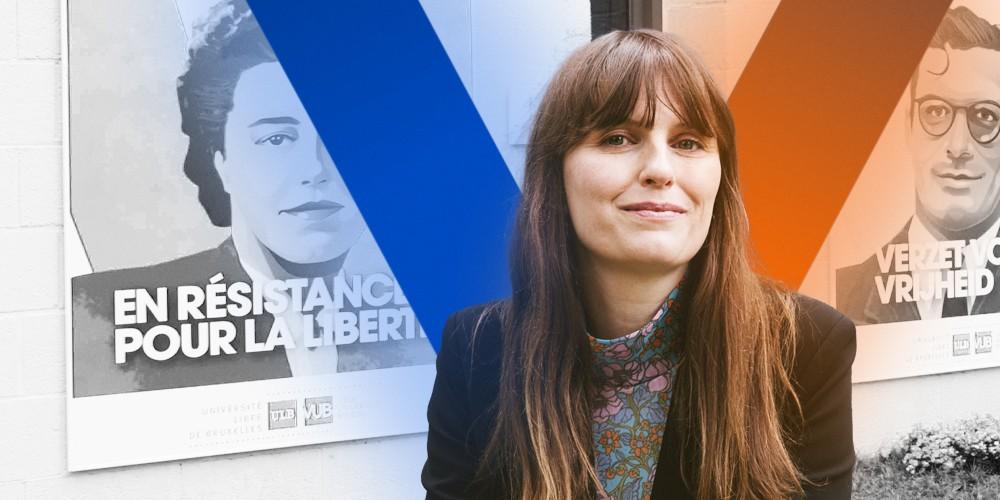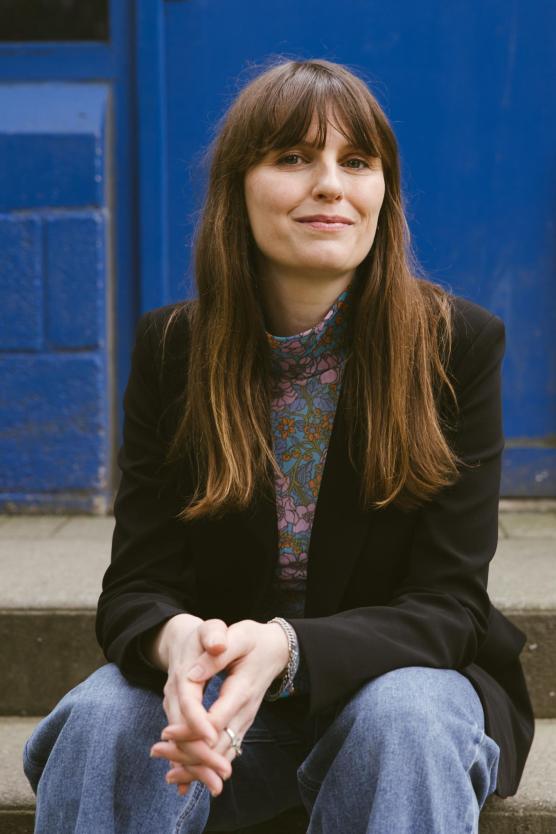
The VUB embraces the ‘V’ of freedom (vrijheid). It guides our story like a compass for resistance and progress. In Vrije Geesten, 32 researchers and opinion-makers share their passion for freedom and reflect on what the ‘V’ in VUB means to them — for their field, their work, and their lives. They inspire us to look at the world with a critical eye and an open mind. Among them is Nel de Mûelenaere, holder of the Chair Traces of Resistance.
Freedom is a versatile concept. It lends itself well to monuments, political slogans and university mottos – after all, who would oppose it? But when it comes to what freedom means and whose freedom we’re talking about, things become less clear-cut. Hannah Arendt challenged the emptiness of “freedom” as an abstract idea by defining it as an act – something we do. For her, freedom is practised in the public sphere, through interaction with others: by writing, speaking, resisting. Resistance, then, becomes both an expression of freedom and a means of defending it.
Seeing freedom as a dynamic, lived political practice helps us grasp how its meaning evolves. If freedom is action, and resistance is one of those actions, then moments of academic protest can reveal how our university community puts the 'Free' in Vrije Universiteit Brussel into practice. In other words, what kinds of freedom has the university fought for – and for whom?
“The key to understanding the vast diversity of academic resistance is solidarity”
The first archaeological layer is still fresh – remnants of a protest camp, a few "Free Palestine" stickers left behind. Dig a little deeper, and you find traces of the student protests against apartheid in South Africa during the 1980s. Further still, and there are the banners from May 1968: a rector's office occupied at what was then the bilingual ULB, slogans demanding more student participation, peace in Vietnam, and the end of the Greek military regime. Messages Geert Buelens described as “hope, liberation and democratisation.”

And then we come to the moment when freedom was a fight for survival. During the Second World War, ULB responded to the totalitarian grip of the New Order with acts of courageous dissidence. The evidence lies in university and national archives – manifestos and petitions from the 1930s protesting the rise of fascism and Nazism; a scathing German inspection report from 1940; the decree suspending Jewish professors; and finally, the Board of Governors’ decision on 24 November 1941 to close the university altogether.
There are notes from clandestine lectures held in the Bois de la Cambre and around kitchen tables. The resistance newspaper Vrijheid, which future VUB rector Aloïs Gerlo contributed to. The farewell letter from resistance fighter and ULB alumnus Youra Livchitz to his mother, written just before his execution. And after the war, the unveiling of the memorial plaque in La Salle des Marbres, engraved with the names of ULB members killed for their acts of resistance.
What can we learn from this historical excavation?
First of all, that the cliché of the ivory tower academic is deeply misplaced. The Free Universities of Brussels have always been arenas where freedoms were defined, defended – and, at times, repressed. Perhaps this is down to the nature of scholarship itself, which, as Jan Blommaert so beautifully put it, relies fundamentally on “the freedom to dissent.” VUB was founded on the principle that anything can be questioned, with scientific reasoning as the only guiding standard. This demands a certain stubbornness – a willingness to challenge commonly accepted truths, authoritative models, and ideological certainties. Or, as the poet Remco Campert put it: "You ask yourself a question / that’s where resistance begins / and then you put that question to someone else."
But academic freedom has never been the only kind of freedom defended on the Oefenplein and the Solbosch campus. The key to understanding the breadth of academic resistance at VUB is solidarity – standing up for the freedoms of others, in every sense of the word: others of a different religion, language, skin colour or belief system. That thread connects the Gaza protests, the Vietnam War demonstrations, and the antifascist resistance of the 1930s and '40s. It reflects a concern not just for the freedom of researchers and their work worldwide, but a broader sense of social commitment. History teaches us that when free inquiry is under threat, it’s often a warning sign for other political freedoms – and vice versa.*
Bio Nel de Mûelenaere
Prof Dr Nel de Mûelenaere is a lecturer in contemporary history at VUB and holds the “Traces of Resistance” chair. Her research focuses on food, resistance and solidarity in Belgium during and between the two World Wars.
*This is a machine translation. We apologise for any inaccuracies.